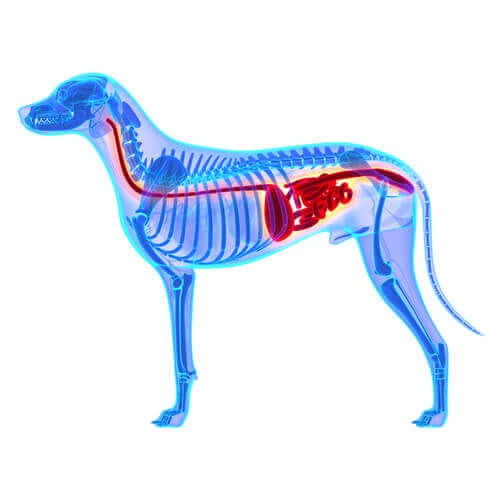Intestinal Microbiota in Dogs


Written and verified by the biologist María Muñoz Navarro
What is “microbiota”? Both humans and dogs have it on their skin, nose, mouth, and intestines. Intestinal microbiota in dogs is an ecosystem of bacteria, fungi, and certain viruses. This is good for them and performs numerous tasks in the body. Changes in microbiota can cause different illnesses.
Most canine-borne diseases are of microbial origin, but not all microorganisms are harmful.
Below we’ll tell you more about the importance of this microscopic world in a dog’s body.
Intestinal microbiota in dogs

Intestinal microbiota or microbiome is a group of beneficial microorganisms that inhabit a dog’s intestine. There they perform many essential functions:
- Stimulating the immune system
- Contributing to a multitude of metabolic processes
- Protecting the body from the contracting other illnesses (resistance to colonization)
Diet, age, and environmental factors directly affect the health of this microbiota, so any alteration can cause disease.
Diet, microbiota and atopic dermatitis
A balanced diet results in healthy skin and immune systems. Studies show that microbiota disorders, such as dysbiosis, directly impact a dog’s health. An example is canine atopic dermatitis.
Risk factor: The intestinal barrier
Foreign and harmful bodies constantly attack the body and the digestive tract is highly exposed to them.
The intestinal wall acts as a selective barrier, allowing nutrients to pass and preventing harmful substances from entering. This is called “intestinal permeability”.
For this reason, when alterations occur, such as inflammation, the bowel wall will absorb more. Therefore, the barrier will break down and allow foreign bodies into the blood which causes numerous diseases.
In addition to digestive function, the wall of the intestine has a defensive function. Micro-organisms immersed in the mucous membrane perform this function, which influences the development of the immune system.
Therefore, a disorder produced in this defense barrier results in exaggerated immune responses (hypersensitivity or allergies), inflammatory digestive diseases, and other extraintestinal illnesses.
A study published by the Journal Frontiers in Physiology concluded that certain skin lesions occur because of these problems. The skin is one of the affected organs, due to an abnormal response of the cells of the mucosal immune system in patients suffering from inflammatory bowel diseases (IBD).
Finally, it’s important to consider pets’ nutritional needs in order to provide them with an adequate diet. For example, both an excess and a deficiency of vitamin A can result in skin lesions such as hyperkeratinization and scaling. In addition to an increase in the likelihood of microbial infections.

Food intolerance
We’ve already seen that microbiota plays a crucial role in developing the immune system. Food allergies, or food hypersensitivity is an exaggerated response of immunological reactions that happen after eating certain foods. This may result in skin or gastrointestinal damage.
It causes 1% of skin diseases and rarely causes disease in the animal’s intestine. On the one hand, however, the most common symptoms in dogs suffering from this type of allergy are itching and, on the other hand, it seems that after inflammatory bowel disease there may be an intolerance problem.
An alteration in bacterial composition can cause immune diseases.
Methods for improving intestinal microbiota of canines
So, what can you do to keep your pet’s intestinal microbiota healthy? Below we’ll offer some suggestions:
- Include probiotics and prebiotics in their diet (in moderation). These foods help improve the function of the intestinal mucosa by producing bacteriocins that increase IgA production and nutrient absorption.

- Fecal Microbiota Transplantation. This restores beneficial bacteria because of changes in the gastrointestinal tract.
- Minimize suffering from stress. As with people, mood alters normal intestinal microflora, thereby increasing permeability and thus causing an inflammation of the microflora. Psychological and physical stress has also been shown to contribute to intestinal dysbiosis. So, keep your dog in a happy and stimulating environment, and give them a diet that meets their psychological and nutritional needs.
Following this advice, you can provide your pet with a diet and environment that suits their health and their well-being.
What is “microbiota”? Both humans and dogs have it on their skin, nose, mouth, and intestines. Intestinal microbiota in dogs is an ecosystem of bacteria, fungi, and certain viruses. This is good for them and performs numerous tasks in the body. Changes in microbiota can cause different illnesses.
Most canine-borne diseases are of microbial origin, but not all microorganisms are harmful.
Below we’ll tell you more about the importance of this microscopic world in a dog’s body.
Intestinal microbiota in dogs

Intestinal microbiota or microbiome is a group of beneficial microorganisms that inhabit a dog’s intestine. There they perform many essential functions:
- Stimulating the immune system
- Contributing to a multitude of metabolic processes
- Protecting the body from the contracting other illnesses (resistance to colonization)
Diet, age, and environmental factors directly affect the health of this microbiota, so any alteration can cause disease.
Diet, microbiota and atopic dermatitis
A balanced diet results in healthy skin and immune systems. Studies show that microbiota disorders, such as dysbiosis, directly impact a dog’s health. An example is canine atopic dermatitis.
Risk factor: The intestinal barrier
Foreign and harmful bodies constantly attack the body and the digestive tract is highly exposed to them.
The intestinal wall acts as a selective barrier, allowing nutrients to pass and preventing harmful substances from entering. This is called “intestinal permeability”.
For this reason, when alterations occur, such as inflammation, the bowel wall will absorb more. Therefore, the barrier will break down and allow foreign bodies into the blood which causes numerous diseases.
In addition to digestive function, the wall of the intestine has a defensive function. Micro-organisms immersed in the mucous membrane perform this function, which influences the development of the immune system.
Therefore, a disorder produced in this defense barrier results in exaggerated immune responses (hypersensitivity or allergies), inflammatory digestive diseases, and other extraintestinal illnesses.
A study published by the Journal Frontiers in Physiology concluded that certain skin lesions occur because of these problems. The skin is one of the affected organs, due to an abnormal response of the cells of the mucosal immune system in patients suffering from inflammatory bowel diseases (IBD).
Finally, it’s important to consider pets’ nutritional needs in order to provide them with an adequate diet. For example, both an excess and a deficiency of vitamin A can result in skin lesions such as hyperkeratinization and scaling. In addition to an increase in the likelihood of microbial infections.

Food intolerance
We’ve already seen that microbiota plays a crucial role in developing the immune system. Food allergies, or food hypersensitivity is an exaggerated response of immunological reactions that happen after eating certain foods. This may result in skin or gastrointestinal damage.
It causes 1% of skin diseases and rarely causes disease in the animal’s intestine. On the one hand, however, the most common symptoms in dogs suffering from this type of allergy are itching and, on the other hand, it seems that after inflammatory bowel disease there may be an intolerance problem.
An alteration in bacterial composition can cause immune diseases.
Methods for improving intestinal microbiota of canines
So, what can you do to keep your pet’s intestinal microbiota healthy? Below we’ll offer some suggestions:
- Include probiotics and prebiotics in their diet (in moderation). These foods help improve the function of the intestinal mucosa by producing bacteriocins that increase IgA production and nutrient absorption.

- Fecal Microbiota Transplantation. This restores beneficial bacteria because of changes in the gastrointestinal tract.
- Minimize suffering from stress. As with people, mood alters normal intestinal microflora, thereby increasing permeability and thus causing an inflammation of the microflora. Psychological and physical stress has also been shown to contribute to intestinal dysbiosis. So, keep your dog in a happy and stimulating environment, and give them a diet that meets their psychological and nutritional needs.
Following this advice, you can provide your pet with a diet and environment that suits their health and their well-being.
This text is provided for informational purposes only and does not replace consultation with a professional. If in doubt, consult your specialist.








